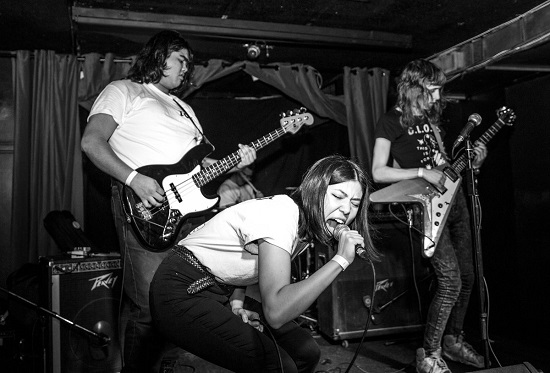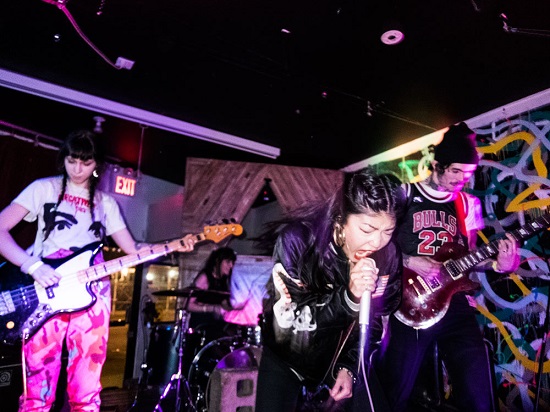Can it be a coincidence that my favourite hardcore album of 2016 to date is titled Poser, while my favourite book of 2016 to date is titled Pretentiousness? They are in many ways very different: the album, by Chicago band The Repos, would undoubtedly be a distracting soundtrack to reading the book, written by an art journal editor named Dan Fox. In their own ways, however, both harness the social power of their chosen word. Never mind that it’s pretty much all in the eye of the beholder – these are terms intended to cut. Describing someone as pretentious is to accuse them of a moral failing, in a sense: being untrue to oneself in the pursuit of the approval of others.
Likewise, ‘poser’ has for decades carried grave weight as an insult in punk and hardcore (and metal, even more so). The image of the crusty/ dropout/ chaotic/ booze-swilling punker who can retreat back to their affluent upbringing whenever convenient is a cliché as old the hills. If The Repos want us to construct a backstory for the tatted-up bro on the cover of Poser, then I envisage him mowing his parents’ lawn in the twilight, in an effort to curry their favour for a few months’ rent. Alternatively, or additionally, the band might be turning the spotlight on themselves: they are, after all, one of the stalwart bands of the Youth Attack label, whose stock in trade is attractive-but-expensive ‘art editions’ issued in cruelly limited numbers. Shit, they pressed 500 copies of Poser and they vanished before I could even consider the objective idiocy of paying a premium to send a 12-minute long player (sic) halfway round the world – so I’m listening to the download, like a poser would do.
Whazzat? I forgot to tell you what the damn thing actually sounds like? Boy, I don’t help myself much! It thoroughly rips is what: pure-bred hardcore and nothing but, scarcely pausing between songs let alone for a breather. Aaron Aspinwall sings like he’s foaming at the mouth, but in a dignified way, while the semi-frequent metal leads that flare up (on the title track and ‘Wild Bore’ for two) act as raucous callbacks to Poison Idea circa Kings Of Punk. It’s a shame I’ve committed myself to never using realness and authenticity as measurements of worth in music, because if I were to tell you that The Repos are just about the realest American hardcore band on the block right now, I think the spectre of objective truth would be on my side.
This band Bad Breeding are a bit of a strange one, while we’re on this tip. They’re from the southern English town of Stevenage, appear to be in their early twenties and play a discordant, choppy grab-bag of goth, anarcho and hardcore with lyrics that confront modern British political and social concerns. They were also described as “the best punk band in Britain” by the Guardian almost a year ago, yet despite this, I’d never heard of them until their self-titled debut album was announced recently. The UK’s current DIY scene is stronger and more creative than I’ve ever known it, but would look like a right dafty if it had been blithely ignoring “the best punk band in Britain” the whole time, wouldn’t it?
On closer inspection, the disconnect is a result of Bad Breeding’s career (which does seem to be the appropriate word) choices: they’ve served as tour support for Royal Blood and Mastodon and played several of those inner-city festivals that are overstuffed with ‘up and coming’ bands who have nothing in common apart from a tenacious booking agent. It may well be working out perfectly for them, but I can’t help feeling that they’re ploughing a lonely furrow, bypassing the communal aspect of punk in favour of echoing deathlessly around continental arenas at 7.45pm.
In the seven years I’ve been writing this column I’ve attempted, however successfully, to talk about the various slimy tentacles that constitute ‘scenes’, rather than just reviewing records I think are good. In that the response is usually one of indifference, it would be easier to fill Straight Hedge with bands like Bad Breeding, who have paid PR companies to request my patronage; but, frankly, I don’t really see the point. However, despite having covered loads of stuff which doesn’t ‘sound punk’ but is considered eligible because of its origins, Bad Breeding is noteworthy by virtue of being the opposite. It’s really not half bad – a few humdrum tracks among a total of 16, but the 32 minutes rattle by quick enough for it to be no biggie – and I feel confident that, in a blind test, it would score approval from most DIY punx who dig anyone from Crisis to Institute.
Everything is doused in tinnitus feedback and migraine drums, and it works a treat. Verbose frontman Christopher Dodd bawls through the din in biting Estuary English, vaguely recalling Colin Jerwood from Conflict, and the marriage of late-70s herbert stomp and early-90s noiserock skree proves fruitful on ‘Separate Me’, ‘Corrupting Fist’ and others. I’d take a punt at one or more members being fans of Ceremony’s Zoo LP, likewise Iceage’s You’re Nothing, but it’s agreeably non-obvious.
One big sticking point is Dodd’s lyrics, which try so hard to say something you can virtually hear him getting a hernia, but end up an object lesson in using big words without arranging them into anything interesting. Still: not only is Bad Breeding a creditable mid-10s British punk record, it’s offered as either a free download or a limited vinyl release, both via the Facebook hyperlink above. It might end up growing on you as well.
I’d also like to clarify that I am definitely not opposed to people emailing me promoting a band or whatever. If George from Damnably Records hadn’t done so, I probably wouldn’t have heard Otoboke Beaver, a Japanese quartet whose debut UK release – Okoshiyasu!!, a comp of everything they’ve done to date – is an essential rudderless joysplosion.
They come from Kyoto, but I have no real idea where they’re, like, coming from; in this instance, I think I prefer it that way. The possibility that Otoboke Beaver might have landed on this deranged, turn-on-a-sixpence jazz-punk sound without the influence of an attendant scene makes it all the more alluring.
The guitars have a sort of garage rock rustiness, but the jagged, relentless patterns they trace goes some way to disguising this. ‘Ultra Miracle Super Saiya Psych Festival’, the album’s longest track, crossbreeds punk, prog and the tankard-clanging jollity of Eastern European drinking music, and somehow ends up reminding me of Nomeansno. ‘Onisan Ano Ne’ starts off as a rhythm-driven tender token, morphs into blaring punk-pop and fills the boots of the late, lamented Erase Errata. Vein-burstingly frantic zealots of the 90s underground, like Dawson and God Is My Co-Pilot, are worth dredging up too, and if you like Japanese women hollering over batshit, complex arrangements then Melt-Banana are the elephant in the room, although Otoboke Beaver rarely sound that much like them (‘Powerfull Busu’ is about as close as they get). Both Okoshiyasu!! and Bakuro Book, a brand new three-song EP, are endorphins disguised as sound files and have fully slayed me. By the time you read this, they’ll have just finished a short UK tour and I am most envious of anyone who caught it.
The deathstare-serious tribal postpunk march of Chroma’s Cuerpos Dóciles twelve-inch (Dê O Fora) is in most respects the polar opposite of what Otoboke Beaver do, yet my reaction is equally Pavlovian. The presence of a woman, or women, shouting in a language I don’t speak – Spanish in this case – is probably a significant factor, an implicit shallowness that I’m not going to let concern me much. Chroma’s vocalist, Rebeca, also plays in Barcelona hardcore band Las Otras, who were reviewed several columns back; she drums rather than sings in them, but has borrowed their echoey, anarcho-influenced vocal style anyway. Prowling gothic basslines sometimes rumble with the inexplicable grey funk of Joy Division, sometimes attempt to summon an apocalypse a la Killing Joke and sometimes remind you that Laura Del Vecchio’s other band is Rakta, a not totally dissimilar ensemble from São Paulo. Almost hardcore-paced on ‘Clasificar, Construir, Corregir’ but more often crunching with the slow menace of military boots on snow, either way Chroma write hellaciously catchy songs where every lyric sounds like a slogan.

Photograph by Carmelo Espanola
It’s a tonic, the way timbre and tone can triumph over unintelligibility. That is to say, I catch the vibe of what Chroma are singing about without needing to hit up Babelfish (still alive since ‘95, Web 1.0 fans!), and while Chicago’s Like Rats are Anglophones, good linguistic luck picking the bones out of Dan Polak’s Gaviscon-gargling growl. Still – with II (Southern Lord), their new album, sporting titles like ‘From Beyond’, ‘Evil Winter’ and ‘Immortal Coil’, you can pretty much figure out what their deal is, right?
If you said “tearing 90s style nihilistic death metal with ample doses of mid-80s Celtic Frost, early doom/death and metallic hardcore agitators like Ringworm,” you’re on the nose – frankly, they should ask you to write this column instead. You’ll probably love this album, too – it’s in touch with classic Florida DM, but rarely hits breakneck tempo, utilising raw production and staying away from all that ersatz drum trigger bollocks. One of the guys from soon-to-be-defunct powerviolent sludgers Weekend Nachos is on bass, so no surprise that his part of the rhythm section sounds like it could punch its way through the side of a marble quarry.

Photograph by Alex Kress @snapsecondskin
Got a hunch that the guy & gals who make up Toronto four-piece Triage also have a lurking Celtic Frost fandom. Power Beat (Larry Distribution), their debut seven-inch, is a metalpunk tornado that’s as likely to be found in Morbid Tales basement thrash mode as hailing three-decades-old metallic crust or the kind of New York hardcore bands who smoked angel dust for breakfast. There’s no on-the-table scientific formula that explains why this EP bangs so hard: Lia Lepre’s vocals are spat out in a hail of pellets, and Sadie Rapson has a guitar tone like a rusty guillotine blade, but there’s little here you could call innovative. It just all hangs together like a dream and feels like the band Triage’s members were born to do (although they actually have multiple other projects on the go). Also, I tend to envisage this sorta music being played by aging sods, but Lepre at least is in her early twenties, which like Celtic Frost’s national flag is a big plus.

Photograph by Lara Goetzl
The five songs on the demo tape by New York’s Krimewatch are variously in English and Japanese. Accordingly, it was good to confirm that the person singing them – Rhylli Ogiura – actually was Japanese, and they weren’t just titling them thus to be ‘weird’ or ‘inscrutable’, but slightly disappointing that she wasn’t Welsh, which her first name sounds like it should be. All that aside, this thing is a stormer: steel-jawed mongrel hardcore that hints at myriad eras and regions (UK82 when it pogoes, NYC ‘83 when the breakdowns land, even modern-day London and Spain via hints of Snob and Las Otras) while marking out its own space and wrapping matters up inside six minutes. You might know guitarist Sean Joyce from Ajax, and so anticipate a rumble with that sick-ass tone he gets; in Krimewatch, it’s more defined and consequently better.
Cards on the table, I don’t know as much about French Oi! music as many of the folks who’ve been flipping out over relatively young Parisians Rixe for a while already, nor am I much cop at speaking their lingo. I do however know enough to know that France has, in the past, harboured some pretty racially unsavoury skinhead bands who might have been more readily shunned if they’d sung in English – so one hesitates before again proclaiming that punk styles transcend language barriers. Rixe are not of this persuasion (I’d have hoped this was taken as a given, really) and are also very good, with second EP Les Nerfs A Vif (La Vida Es Un Mus) improving on their also-sterling 2015 debut. They’re generally midpaced and melodic, ‘Rapport De Force’ speeding up enough to take on a slight Stiff Little Fingers resemblance, and throw together riffs that measure up to Oi!’s absolute A-list – ‘Hexagone’ is certainly their crowning moment to date. It addresses domestic terrorism on some level, I think, but if you don’t want to think, Rixe have a song for you just called ‘Rixe’. It has four lines and is about fighting. As a digestif, here’s their bassist Victor Neuski talking about the time he was in the video for Beyonce’s ‘Flawless’.

The good folks of 1981 are still reeling from my unscheduled guest time travel appearance, during which I told them that 35 years in the future, buzzcutted Oi! ruffians and sweet-natured reggae-appropriating postpunkers would sit unproblematically side by side. In the reviews columns of the day’s most respected music websites, at least, I clarified, before being burned as a witch when I tried to explain what a ‘website’ was. Any road, I was referring to The World, who are from Oakland and recently released their first record, a four-song EP on Upset The Rhythm. It sounds like something that fell down the back of the release schedule during the pre-Smiths days of Rough Trade Records: chunka-chunka ska basslines, two saxophones engaged in collective action and Amber Sermeno nailing that quavering vocal stridency which was part of Ari Up and Lora Logic’s splendour. The title track is the brisk dancefloor hit, while ‘Talk’ has a shy Young Marble Giants demeanour and ‘It Takes’ slathers post-production dub FX on with alluring results.
Human Crop Circles is a retrospective ten-song LP by Humans The Size Of Microphones: an early-00s band from Southampton who accrued a fabled reputation despite, or because of, rarely being seen or heard. While the audience for this marginal Brit-emo excavation is likely small and specific, the labels Superfi and Graanrepubliek have done the Lord’s work in assembling it. HTSOM’s niche was emotional hardcore, musically adjacent to American bands on labels like Ebullition and Witching Hour (vocalist Pete Osmond ran a distro in the 90s that carried this sort of thing when it was otherwise unobtainable in the UK) but with a distinctly British wit.
Fears of offputting zaniness, such as a song called ‘I See The World Through Rose Tinted Testicles’, are allayed by a satisfyingly sharp way with phrasing and imagery. “The four horsemen of the apocalypse now/ Ignore the one way system in the centre of town,” states ‘No One Gets Out Alive’, one of five unheard-until-now songs recorded in 2005. If that reads to you like it might be a bit tricky to fit into a tune, HTSOM are helped in this regard by their spasmodic, chaotic approach – roughly in the orbit of Mohinder and Heroin, but with longer songs and a lurching noiserock undercarriage that sometimes reminds me of an emo Part Chimp (of all things).
The album’s other five tracks were originally released as a demo CD in 2002, and address that year’s myopic conflict in Afghanistan from an anti-war perspective; emo has a tendency to favour introspection over politics, but not these guys. Humans The Size Of Microphones hid their light under a bushel during their time together, yet in this reporter’s opinion they’ve aged more robustly than most of the British punk underground of ten to 15 years ago. Peers can recall them fondly, everyone else can thrill to them for the first time.


